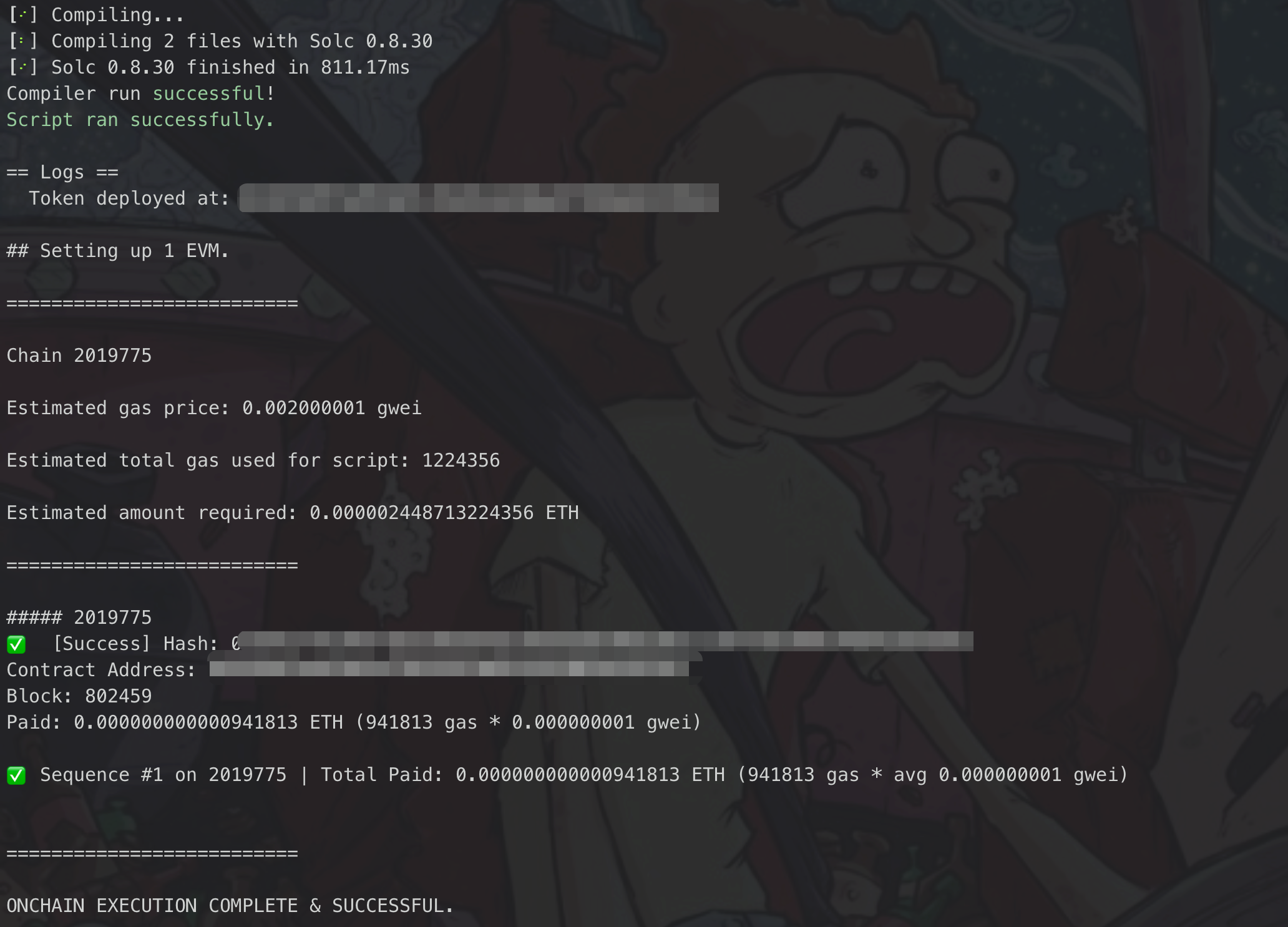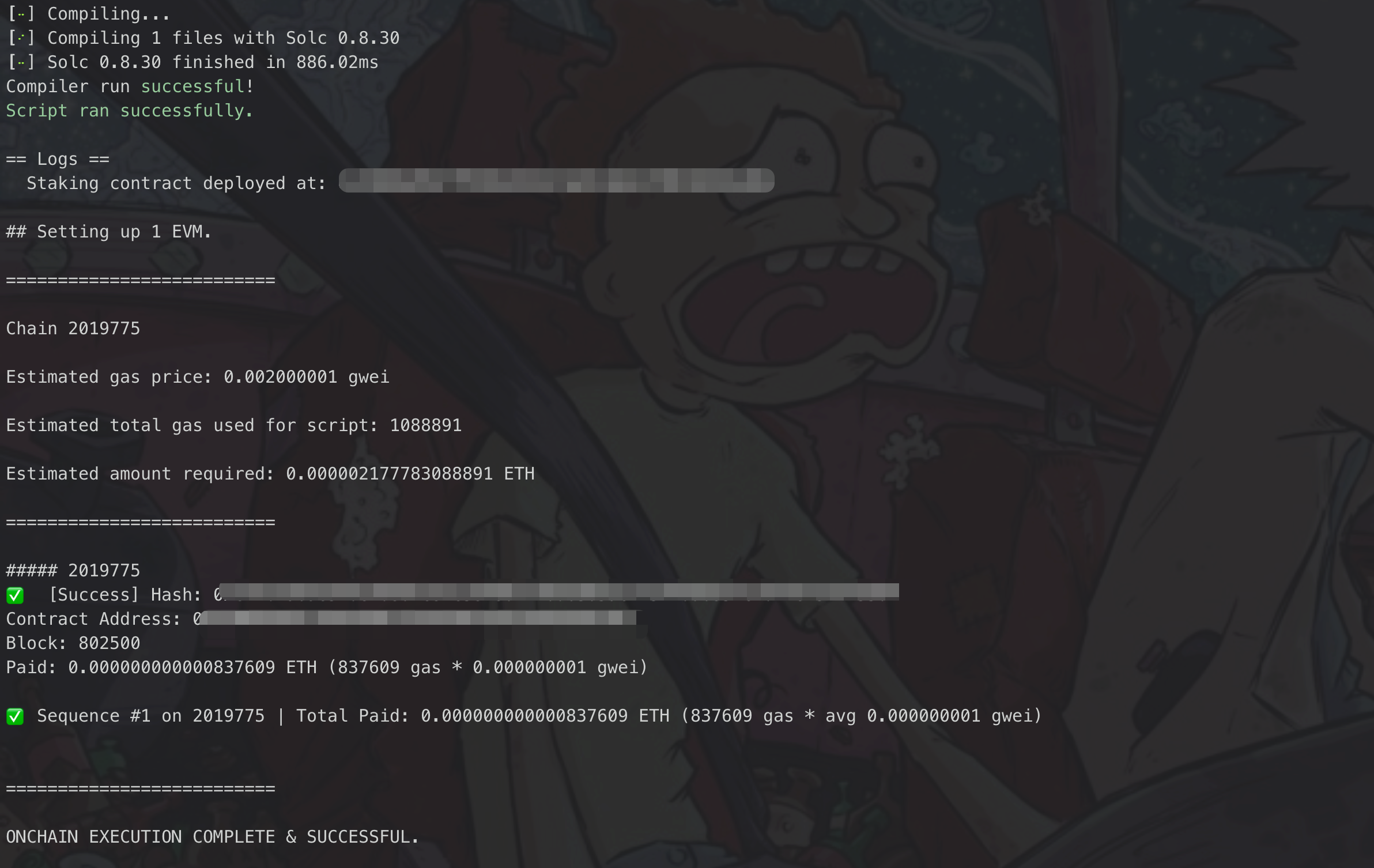Build and Deploy a Simple Staking Contract
This guide walks you through the process of building and deploying a basic token staking contract on Jovay, a fully Ethereum-compatible blockchain. If you're already familiar with using Foundry to develop smart contracts, you'll feel right at home — Just write, build, and deploy like you always do. New to Foundry? No problem. This document follows standard Foundry practices and includes all the steps you need to get started with confidence.
By the end, you’ll have:
- Deploy an ERC-20 token
- Build a staking contract that rewards users over time
- Stake, claim rewards, and withdraw tokens programmatically
Before you begin, please note the connection details for the network you are targeting:
| Network | RPC URL | Chain ID |
|---|---|---|
| Jovay Mainnet | https://rpc.jovay.io | 5734951 |
| Jovay Testnet | https://api.zan.top/public/jovay-testnet | 2019775 |
This guide will use the Testnet configuration in its examples.
🧰 Prerequisites
Before starting, make sure you have:
- Have Foundry Installed – Foundry
- Have an account with funds – You can get DEV tokens for testing on Jovay once every 24 hours from the Faucet
- Access to Jovay Devnet or Testnet – To deploy and interact with your token, you will need to have your own endpoint and API key, which you can get from one of the supported QuickStart
Step 1: Set Up Your Project
Clone the example repository:
bashwget 'https://web3-static-prod.oss-ap-southeast-1.aliyuncs.com/static/Jovay/JovayExamples.tar.gz' tar -xvzf JovayExamples.tar.gz cd JovayExamples/foundry/StakingExample/Install OpenZeppelin Contracts:
Foundry uses forge to manage dependencies. Install OpenZeppelin contracts:
bashforge install OpenZeppelin/openzeppelin-contracts --no-git
Step 2: Configure Your Environment
Before writing the contract, it's best to set up your deployment environment.
1. (Optional) Generate a Private Key
To deploy contracts, you need a wallet with a private key. If you don't have one, you can generate a new one using ethers.js.
First, install ethers.js in a temporary directory:
npm i ethersNext, create and run a gen_eth_key.js script to get a new keypair.
const { ethers } = require('ethers');
const wallet = ethers.Wallet.createRandom();
console.log('Private Key:', wallet.privateKey);
console.log('Address :', wallet.address);Run the script:
node gen_eth_key.jsThe output will give you a new Private Key and Address. Save these securely. You will use the Private Key in the next step. Remember to also send some testnet funds to the new Address using the Jovay Faucet.
2. Set Environment Variables
Foundry scripts read configuration like private keys and RPC URLs from environment variables. You can set them in your shell for the current session.
For Testnet (as used in this guide's examples):
export PRIVATE_KEY="YOUR_TESTNET_WALLET_PRIVATE_KEY"
export RPC_URL="https://api.zan.top/public/jovay-testnet"For Mainnet:
export PRIVATE_KEY="YOUR_MAINNET_WALLET_PRIVATE_KEY"
export RPC_URL="https://rpc.jovay.io"Tip: For a more permanent solution, you can add these
exportlines to your shell's profile file (e.g.,.bashrc,.zshrc) or save them in a.envfile and runsource .envin your terminal before you start working.
Step 3: Write the Token Contract
Create a New Solidity File:
bashtouch src/MyToken.solPaste the following code into
src/MyToken.sol:solidity// SPDX-License-Identifier: MIT pragma solidity ^0.8.0; import "@openzeppelin/contracts/token/ERC20/ERC20.sol"; contract MyToken is ERC20 { constructor(uint256 initialSupply) ERC20("MyToken", "MTK") { _mint(msg.sender, initialSupply); } function decimals() public pure override returns (uint8) { return 6; } }Compile the Smart Contract:
bashforge buildTest the Smart Contract (optional but recommended):
bashtouch test/MyToken.t.solPaste the following code into
test/MyToken.t.sol:solidity// SPDX-License-Identifier: MIT pragma solidity ^0.8.0; import "forge-std/Test.sol"; import "../src/MyToken.sol"; contract MyTokenTest is Test { MyToken public token; address public owner = address(0x1); address public alice = address(0x2); function setUp() public { vm.prank(owner); token = new MyToken(1_000_000e6); // initial supply with 6 decimals } // Test name and symbol function testNameAndSymbol() public view { assertEq(token.name(), "MyToken"); assertEq(token.symbol(), "MTK"); } // Test initial supply function testInitialSupply() public view { assertEq(token.balanceOf(owner), 1_000_000e6); } // Test decimals are 6 function testDecimals() public view { assertEq(token.decimals(), 6); } // Test token transfer function testTransfer() public { vm.startPrank(owner); uint256 sendAmount = 100e6; // 100 tokens uint256 ownerBalanceBefore = token.balanceOf(owner); uint256 aliceBalanceBefore = token.balanceOf(alice); token.transfer(alice, sendAmount); uint256 ownerBalanceAfter = token.balanceOf(owner); uint256 aliceBalanceAfter = token.balanceOf(alice); assertEq(ownerBalanceAfter, ownerBalanceBefore - sendAmount); assertEq(aliceBalanceAfter, aliceBalanceBefore + sendAmount); vm.stopPrank(); } // Test transfer reverts when balance is insufficient function testTransferRevertsWhenInsufficientBalance() public { vm.expectRevert(); token.transfer(alice, 1_000_001e6); // Attempt to send more than balance } }Test it:
bashforge test
Step 4: Deploy the Token Contract
Create a Deployment Script:
bashtouch script/DeployMyToken.s.solPaste the following code into
script/DeployMyToken.s.sol:solidity// SPDX-License-Identifier: MIT pragma solidity ^0.8.20; import "forge-std/Script.sol"; import "../src/MyToken.sol"; contract DeployMyToken is Script { function run() external { uint256 deployerPrivateKey = vm.envUint("PRIVATE_KEY"); vm.startBroadcast(deployerPrivateKey); MyToken token = new MyToken(1_000_000e6); // Initial supply console.log("Token deployed at:", address(token)); vm.stopBroadcast(); } }Deploy the contract:
bashforge script script/DeployMyToken.s.sol --rpc-url $RPC_URL --broadcastIf your script's execution succeeds, your terminal should resemble the output below:

Step 5: Write the Staking Contract
Create a New Solidity File:
bashtouch src/SimpleStaking.solPaste the following code into
src/SimpleStaking.sol:solidity// SPDX-License-Identifier: MIT pragma solidity ^0.8.0; import "@openzeppelin/contracts/token/ERC20/utils/SafeERC20.sol"; contract SimpleStaking { using SafeERC20 for IERC20; IERC20 public stakingToken; uint public rewardRate = 1e18; uint public totalStaked; struct User { uint amount; // current stake amount uint lastTime; // last update time uint unclaimedRewards; // unclaimed rewards } mapping(address => User) public users; constructor(address _stakingToken) { require(_stakingToken != address(0), "Cannot be zero address"); stakingToken = IERC20(_stakingToken); } // stake function stake(uint amount) external { require(amount > 0, "Cannot stake 0"); stakingToken.safeTransferFrom(msg.sender, address(this), amount); User storage u = users[msg.sender]; if (u.amount > 0) { _update(msg.sender); } else { u.lastTime = block.timestamp; } u.amount += amount; totalStaked += amount; } // claim reward function claimRewards() external { _update(msg.sender); uint rewards = users[msg.sender].unclaimedRewards; require(rewards > 0, "No rewards to claim"); users[msg.sender].unclaimedRewards = 0; stakingToken.safeTransfer(msg.sender, rewards); } // withdraw and claim reward function withdraw(uint amount) external { User storage u = users[msg.sender]; require(u.amount >= amount, "Not enough staked"); _update(msg.sender); uint rewards = u.unclaimedRewards; u.unclaimedRewards = 0; u.amount -= amount; totalStaked -= amount; stakingToken.safeTransfer(msg.sender, amount + rewards); } function checkRewards(address user) public view returns (uint) { User memory u = users[user]; uint timeDiff = block.timestamp - u.lastTime; return u.unclaimedRewards + timeDiff * rewardRate * u.amount / 1e18; } // update reward function _update(address user) internal { User storage u = users[user]; uint timeDiff = block.timestamp - u.lastTime; u.unclaimedRewards += timeDiff * rewardRate * u.amount / 1e18; u.lastTime = block.timestamp; } }Compile the Smart Contract:
bashforge buildTest the Smart Contract (optional but recommended):
bashtouch test/SimpleStaking.t.solPaste the following code into
test/SimpleStaking.t.sol:solidity// SPDX-License-Identifier: MIT pragma solidity ^0.8.20; import "forge-std/Test.sol"; import "../src/MyToken.sol"; import "../src/SimpleStaking.sol"; contract SimpleStakingTest is Test { MyToken public token; SimpleStaking public staking; address owner = address(0x1); address alice = address(0x2); function setUp() public { vm.startPrank(owner); token = new MyToken(10_000_000e6); // deploy empty token.transfer(alice, 1000e6); staking = new SimpleStaking(address(token)); token.transfer(address(staking), 1000_000e6); vm.stopPrank(); } function testStakeAndGetRewards() public { uint amount = 100e6; // Mint and approve tokens for Alice vm.startPrank(alice); token.approve(address(staking), amount); staking.stake(amount); // Simulate time passing (1 hour) vm.warp(block.timestamp + 3600); // Check rewards uint rewards = staking.checkRewards(alice); assertGt(rewards, 0); // Claim rewards staking.claimRewards(); assertEq(staking.checkRewards(alice), 0); vm.stopPrank(); } function testWithdraw() public { uint amount = 100e6; vm.startPrank(alice); token.approve(address(staking), amount); staking.stake(amount); // Withdraw staking.withdraw(amount); assertEq(token.balanceOf(alice), 1_000e6); vm.stopPrank(); } }Test it:
bashforge test
Step 6: Deploy the Staking Contract
Create a Deployment Script:
bashtouch script/DeploySimpleStaking.s.solPaste the following code into
script/DeploySimpleStaking.s.sol:solidity// SPDX-License-Identifier: MIT pragma solidity ^0.8.20; import "forge-std/Script.sol"; import "../src/SimpleStaking.sol"; contract DeploySimpleStaking is Script { function run() external { uint256 deployerPrivateKey = vm.envUint("PRIVATE_KEY"); address tokenAddress = vm.envAddress("TOKEN_ADDRESS"); vm.startBroadcast(deployerPrivateKey); SimpleStaking staking = new SimpleStaking(tokenAddress); console.log("Staking contract deployed at:", address(staking)); vm.stopBroadcast(); } }Set your token address:
bashexport TOKEN_ADDRESS=<your token address>Deploy the contract:
bashforge script script/DeploySimpleStaking.s.sol --rpc-url $RPC_URL --broadcastIf your script's execution succeeds, your terminal should resemble the output below:

Step 7: Interact with the Staking Contract
Create a script:
bashtouch script/InteractSimpleStaking.s.solPaste the following code into
script/InteractSimpleStaking.s.sol:solidity// SPDX-License-Identifier: MIT pragma solidity ^0.8.20; import "forge-std/Script.sol"; import {console} from "forge-std/console.sol"; import "../src/MyToken.sol"; import "../src/SimpleStaking.sol"; contract InteractStaking is Script { function run() external { uint256 deployerPrivateKey = vm.envUint("PRIVATE_KEY"); address tokenAddress = vm.envAddress("TOKEN_ADDRESS"); address stakingAddress = vm.envAddress("STAKING_ADDRESS"); MyToken token = MyToken(tokenAddress); SimpleStaking staking = SimpleStaking(stakingAddress); vm.startBroadcast(deployerPrivateKey); // Approve and stake token.approve(stakingAddress, 10e6); staking.stake(10e6); console.log("Tokens staked."); // Add reward pool to Staking contract uint256 rewardPoolAmount = 100_000e6; token.transfer(address(staking), rewardPoolAmount); // Simulate time passing (1 hour) // Claim rewards after 1 hour // staking.claimRewards(); console.log("Rewards claimed."); // Withdraw staking.withdraw(10e6); console.log("Tokens withdrawn."); vm.stopBroadcast(); } }Set your token address and staking address:
bashexport TOKEN_ADDRESS=<your token address> export STAKING_ADDRESS=<your staking address>Execute the script:
bashforge script script/InteractSimpleStaking.s.sol --rpc-url $RPC_URL --broadcastIf your script's execution succeeds, your terminal should resemble the output below:

❓ Troubleshooting Tips
- Deployment fails? Make sure your wallet has enough testnet tokens.
- Can't stake or transfer? Confirm the token has been approved by the staking contract.
- Rewards not updating? Make sure you're calling
_update()before checking balances.
✅ Conclusion
You've just built and deployed a fully functional token staking system on the Jovay blockchain using Foundry!
This includes:
- A mintable ERC-20 token
- A time-based reward staking contract
- Scripts for deployment and interaction
Now you can expand this system with features like:
- NFT-based staking
- Multiple reward tiers
- Locking periods
- Governance integration
If you hit any issues, refer back to this guide or consult the official Foundry documentation.
Happy coding! 🚀